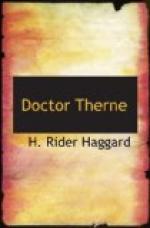“What is it, Antonio?” I asked. “Are the brigands after us?”
“No, senor, hope brigands not come now. This senor say much sick San Jose.”
I answered that I was very sorry to hear it, but that I meant to go on; indeed, I think that it was only terror of the brigands coupled with the promise of a considerable reward which persuaded him to do so, though, owing to my ignorance of Spanish and his very slight knowledge of English, precisely what he feared I could not discover. In the end we started, and towards evening Antonio pointed out to us the hacienda of Concepcion, a large white building standing on a hill which overshadowed San Jose, a straggling little place, half-town, half-village, with a population of about 3,000 inhabitants.
Just as, riding along the rough cobble-paved road, we reached the entrance to the town, I heard shouts, and, turning, saw two mounted men with rifles in their hands apparently calling to us to come back. Taking it for granted that these were the brigands following us up, although, as I afterwards discovered, they were in fact rurales or cavalry-police, despite the remonstrances of Antonio I urged the jaded mules forward at a gallop. Thereupon the rurales, who had pulled up at a spot marked by a white stone, turned and rode away.
We were now passing down the central street of the town, which I noticed seemed very deserted. As we drew near to the plaza or market square we met a cart drawn by two mules and led by a man who had a serape wrapped about his nose and mouth as though it were still the hour before the dawn. Over the contents of this cart a black cloth was thrown, beneath which were outlined shapes that suggested—but, no, it could not be. Only why did Antonio cross himself and mutter Muerte! or some such word?
Now we were in the plaza. This plaza, where in happier times the band would play, for all Mexicans are musical, and the population of San Jose was wont to traffic in the day and enjoy itself at night, was bordered by an arched colonnade. In its centre stood a basin of water flowing from a stone fountain of quaint and charming design.
“Look at all those people sleeping,” said Emma, as we passed five or six forms that, very small and quiet, lay each under a blanket beneath one of the arches. “Why, there are a lot more just lying down over there. What funny folk to go to bed in public in the afternoon,” and she pointed to a number of men, women and children who seemed to be getting up, throwing themselves down and turning round and round upon mattresses and beds of leaves in the shadow of the arcade which we approached.
Presently we were within three paces of this arcade, and as we rode up an aged hag drew a blanket from one of the prostrate forms, revealing a young woman, over whom she proceeded to pour water that she had drawn from a fountain. One glance was enough for me. The poor creature’s face was shapeless with confluent smallpox, and her body a sight which I will not describe. I, who was a doctor, could not be mistaken, although, as it chanced, I had never seen a case of smallpox before. The truth is that, although I have no fear of any other human ailment, smallpox has always terrified me.




